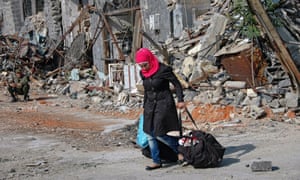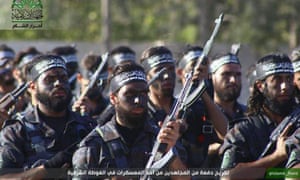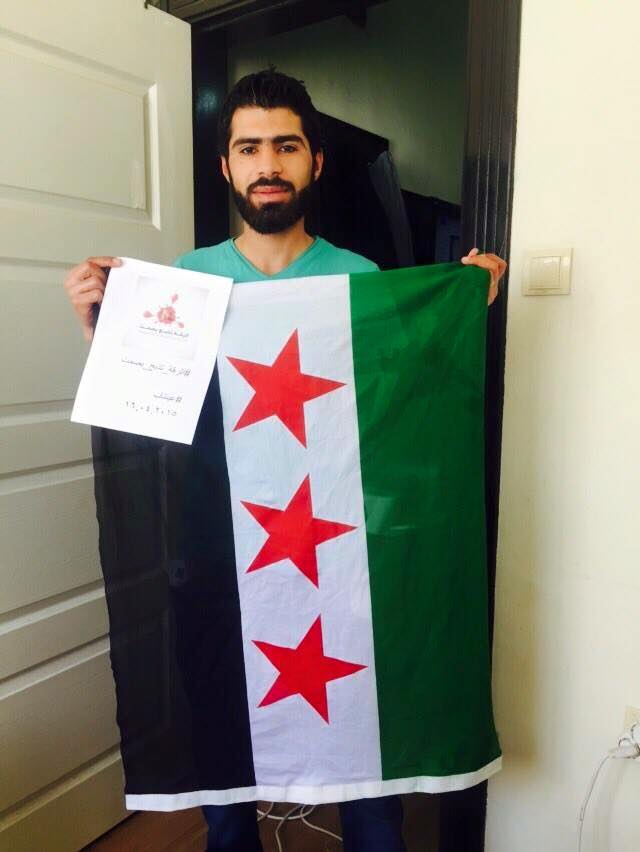 'Eight months ago, the Douma local council—the body that has governed there since the fall of 2012—obtained money to expand the cemetery, from one tier to seven, and to hire new workers to bury the dead.
'Eight months ago, the Douma local council—the body that has governed there since the fall of 2012—obtained money to expand the cemetery, from one tier to seven, and to hire new workers to bury the dead.
On February 14, three of those newly hired graveyard workers were killed by a regime shell as they buried another local man who himself had been killed by regime shelling. Two days before, two of the children of one of the graveyard workers, ages seven and nine, were killed by a shell on their way to school. The local council has a photograph of them; the council keeps as much documentation as it can of atrocities against its citizens in hopes that the perpetrators will one day be brought to justice.
Extended families no longer attend funerals in Douma. With the possibility of shelling, it is considered too dangerous: people are afraid of having their whole families killed at once if they are shelled. Only two or three family members come to oversee the burials. Ahmed Taha, one of the founders of the Douma local council, now its representative in Turkey, says the regime doesn’t care about targeting funerals: “Those who shell people in the market don’t have a problem with targeting a funeral.”
In October of 2012, after Bashar al-Assad’s forces withdrew completely from the town of Douma, there were no more municipal services. Trash began to pile up. “We got together and decided we had to do something about providing services to people,” says Taha, a former Douma resident who was once a mechanical engineer, in his Spartan office in Gaziantep in Southeastern Turkey. Along one wall are images of children, dozens of them, one with her face painted the colors of the Syrian flag. All but one of the children in the photographs are dead. Most were from Douma. The Douma local council has offices that deal with the basics: water and electricity, health and education, agriculture, legal affairs, civil records, sanitation, subsidies, women’s affairs, employment, media and the cemetery.
Notably, there is no department of religious affairs. All the mosques are controlled by the Salafis of Jeish al-Islam, whose name translates to the Army of Islam. This group took over Douma in November of 2014 and arrested all the imams who didn’t share its hardline beliefs, says Taha. Before the revolution, the state controlled the mosques. Jeish al-Islam tried to take over the council too but soon gave up. “They knew they would fail if they put their sheikhs in charge,” says Taha, who says most of the council’s members are technocrats: engineers, lawyers, members of civil society.
“Since the siege, no one has worked in their original jobs,” he says. He and many of the others on the council identify as socialists but there are also a number of members from the Muslim Brotherhood. Taha says they work well together, and even some Salafis joined the council eventually.
There are 416 local councils across Syria in areas not controlled by the regime or the Islamic State, and eight provincial councils. Many hold elections, some popular, others by representative bodies. In Douma, the council holds elections on an annual basis.
The council doesn’t have a prison, but Jeish al-Islam, responsible for military activities in the area, does. Taha says when you have an armed group take over an area, a prison is usually the first thing it builds. Taha himself was jailed more than two decades ago by the current president’s father, Hafez al-Assad.
“In 1991 I was jailed for a year for writing a statement against the regime. I spent a year in solitary confinement. For a year I saw no light. But a year is nothing for Syrian activists.” This is a common sentiment among Syrians, many of whom don’t even bring up their detentions if it was a few months, thinking it not significant enough to mention in the face of the hardship of those who spent decades behind bars under the Assad regimes.
“In Douma there are no days that pass without shelling; sometimes it’s light, sometimes it’s heavy,” says Taha. “Before the Russian intervention, the night was safe. When it rained, when there was fog, it was safe. After the Russian intervention, there is 24 hours of danger. Their planes aren’t affected by these things.”
Life in Dareya takes place almost entirely underground: the field hospital, run by the local council, is in the basement of an apartment building—it’s the only hospital left in Daraya, the schools too and most families have moved into the basement of buildings to escape the shelling. Here the local council is doing what it can—the biggest needs civilians face are money, medicine and fuel. The council also tries to work with refugees and Internally Displaced Persons (IDPs) inside Syria. For a month, the city has been completely cut off, even from adjacent towns from which residents would normally pick up the aid they’re able to get. In this video, children of Daraya describe the food shortages under the siege: they ask their mothers for food and the mothers tell them to eat olives, it’s all they have left.
“If the Syrian Democratic Forces [a largely Kurdish entity that also includes some Arab, Turkmen and Armenians as well as some free Syrian army units who, according to recent evidence, are likely coordinating with the regime and the Russian air force] and the regime take the area [referring to Aleppo and the countryside around it] then all of our work will be for nothing because they consider the local councils to be a part of the revolution,” says Dr. Diaa Abdallah, a former member of the Aleppo City Council, “there is the choice of the revolution--those who reject both the regime and Daesh. It’s the Free Syrian Army and the local councils. The local councils are the civilian side of the revolution... It’s like a civilian and a military wing, a Ministry of Defense and a Ministry of Civilian Affairs.”
“We are trying to have an alternative organization to govern the city because Assad’s propaganda depends on the narrative, ‘only I can control Syria and if you throw me out, Syria will burn,’” says Tarek Matarmawi, a member of the Daraya local council. “The local councils offer a real alternative to Daesh and Bashar,” Matarmawi says, but he worries that the West has already decided to back the dictator. “They think, if you leave Bashar, yes, it’s bad for Syria, but at least you won’t have bombs in Paris.”
Taha says the regime is particularly threatened by the local councils: “The regime targets us a lot because they see it as a logical alternative, it’s local governance,” he says. “It’s a scary future and these latest developments with Russia are a catastrophe. If it continues, the regime might take Damascus, Homs and the coast. If that happens, there will be a campaign against Douma and Ghouta [which are liberated areas] and there will be an independent Kurdish state. In the end, the US left it all to Russia.”
Ahmed Taha finds it difficult to be in Turkey, away from his home town. He says he feels guilty for leaving. He left Douma in order to get medical care for his son. He sent his family ahead of him. Two days after they left, his son’s school was bombed. He realized it was time to go.
Now, in Turkey, he has other frustrations:
“The Muslim Brotherhood control the curriculum because of their relationship with Turkey. They keep telling my son about djinns and hell. In Douma my children were scared of planes, now they’re scared of djinns!” Says Taha, “he comes home at seven o’oclock, then I have to stay up until midnight undoing all their brainwashing!” '




